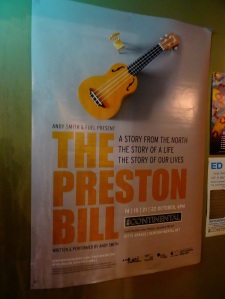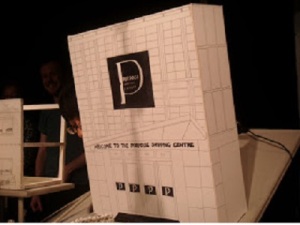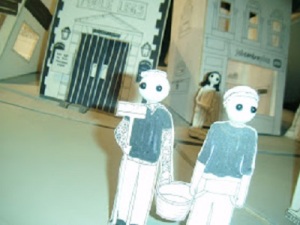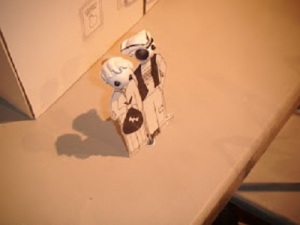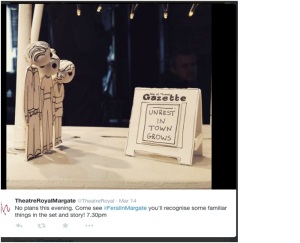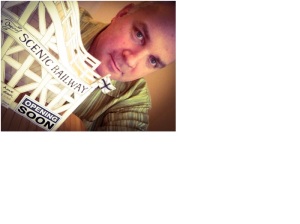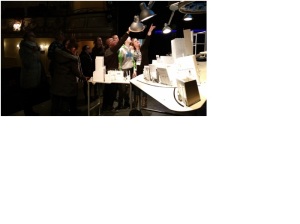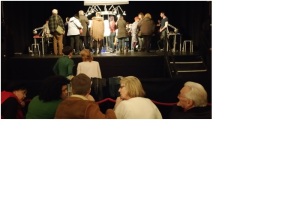It’s transition time for New Theatre in Your Neighbourhood, as Fuel enter the final period of the research project and shift to doing this work – of building stronger relationships with theatres and communities – as their daily practice. A big step into that shift has now been taken, with the establishment of a network of volunteers in the five NTiYN towns, people who will act as ambassadors in their local communities, invigorating interest not only in Fuel’s shows but any intriguing touring productions in the upcoming autumn and spring programmes.
I have mixed feelings on the volunteer front: on the one hand, it’s great that this invitation to work in partnership with theatre-makers is so open and wide-reaching: the volunteers recruited over the past couple of months might be theatre fans, but very few of them are specialists or practitioners; instead they bring a variety of work backgrounds and an age range spanning at least three decades. On the other hand, they’re not paid, and that jangles.
And on the other hand again, there is in the fabric of the network a different economic structure, an exchange mechanism which values endeavour not with money but barter. As a matter of course that will include free tickets to see Fuel’s (and, it’s hoped, other companies’) shows; but to get the network going, it meant something bigger. It meant the volunteers being brought from all over the country to Edinburgh, to spend a weekend at the fringe festival with Fuel, seeing shows, sharing thoughts and generally having fun – with travel, accommodation, food and tickets covered.
I joined the group to host a few Theatre Clubs, and to lead a writing workshop, as a way of encouraging the volunteers to create their own discussions and blogs as part of their advocacy work. It’s always fascinating introducing Theatre Club to new people; it’s based on the book group, but not everyone appreciates the absence of the theatre-makers and the chance that affords to articulate perhaps unformed, contradictory or deeply personal responses to a show; often there will be someone who feels frustrated, so full is their head of questions that dig into why and how this work was made. I particularly noticed, with this volunteer group, how quick I can be in dismissing the idea that the theatre-maker(s) should be involved: I recognised the extent to which that reflects my experience of working alongside theatre, and resolved to experiment more with ways of including makers in the discussions.
The group took the time to sit down together after each of the three Fuel shows we saw – Potrait, I Am Not Myself These Days and Fiction – and compare reactions. Portrait inspired a lot of praise for its writer-performer, Racheal Ofori, and some thoughtful political conversation about race inequality and feminism. All of us were impressed with the way Ofori makes direct criticisms of the social structures of white privilege without coming across as hectoring or alienating; and with her reflections on female experience, the daily battle with expectations around body image, relationships and ambition. Tom Stuart’s adaptation and performance of the autobiography I Am Not Myself These Days left some in the group shaken by its often visceral portrayal of a young drag queen’s obsessive affair with a drug-addicted male prostitute, while others were too aware of the virtuosity of the writing and staging to feel that deeply moved. Fiction was just as divisive: some in the group loved not really knowing what this dream narrative was doing or saying, others desperately wanted to sit down with writer Glen Neath and director David Rosenberg and interrogate them about the work and their thinking; some people were exhilarated by sitting in the pitch black with voices whispering, cajoling and barking in their ears, others experienced a nauseous sense of claustrophobia and needed to gulp down some fresh air immediately afterwards.
The writing workshop was illuminating, too: we talked through a set of reviews, some published by “professional” critics in newspapers, some from online theatre publications, some from local press, some from individual blogs, essentially reviewing the reviews. I always find workshops like this fascinating, because again, my involvement in writing skews my opinions on it: I incline towards experiment, personal insight and poetry – exactly the stuff that others find indulgent, waffly and obscure. We got off to a difficult start with many in the group finding the set of reviews of the Uninvited Guests show This Last Tempest intimidating: so wordy and full of knowledge that the volunteers felt they could never hope to write anything like that. There was much more excitement about a review presented as a Whatsapp conversation, and another that used memes and gifs to respond to a show: this felt, particularly to the artists in the group, like a brilliant, conversational and accessible way into writing about theatre. Sure enough, a couple of days after the workshop, one of the volunteers – Helen Lee, based near Colchester – sent in the following to response to Fiction. At the risk of sounding like a soppy idiot, I couldn’t feel more proud that this was what the workshop inspired her to do.
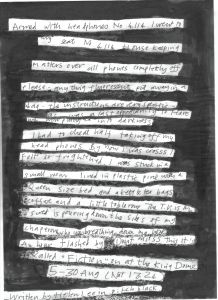
Update! Another new volunteer, Anna, has also written the following brief but tender reflection on one of the Edinburgh shows, this time I Am Not Myself These Days. And again, I’m ridiculously excited that this encounter with Fuel has encouraged her to start a blog and share these thoughts:
Last month I was swamped by fabulous theatre and fascinating discussions. It is hard to pinpoint exactly what I love about theatre but a big part of it is the transportation to other worlds, other ways of being and perspectives.
I Am Not Myself These Days showed me a world very different from my own, with the glamorous and fragile Aqua taking us on a tour through the world of a successful drag queen in New York, with all the booze, drugs and hogtied businessmen that that entails.
Despite how alien it was from my own experience, I was struck by the universality of love and relationships. The triangle of Josh (who works as Aqua at nights, whilst working in an office by day), Aqua and Jack (their partner) was shown to us in heartbreaking detail with all its messiness. As Josh navigates his, and Aqua’s, places in the world and in love, I was captivated and moved by their story, and laughed and cried (well, wept, if I’m honest) along with it.
I could see devastating similarities between Aqua’s spiral into despair and alcohol and that of friends, family and people I have worked with as a psychologist. At times I just wanted to give her a hug, and protect her from the world.
In our discussion group afterwards, it made us think about what we have to leave behind of ourselves in order to grow up, to be safe, to be happy. We talked about vulnerability and making mistakes, we talked about what mistakes shape us, and we wondered whether experiences that we don’t regret can even be counted as mistakes.
